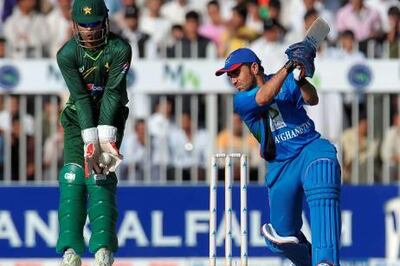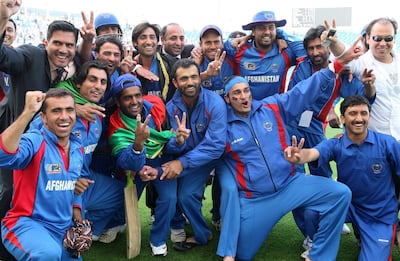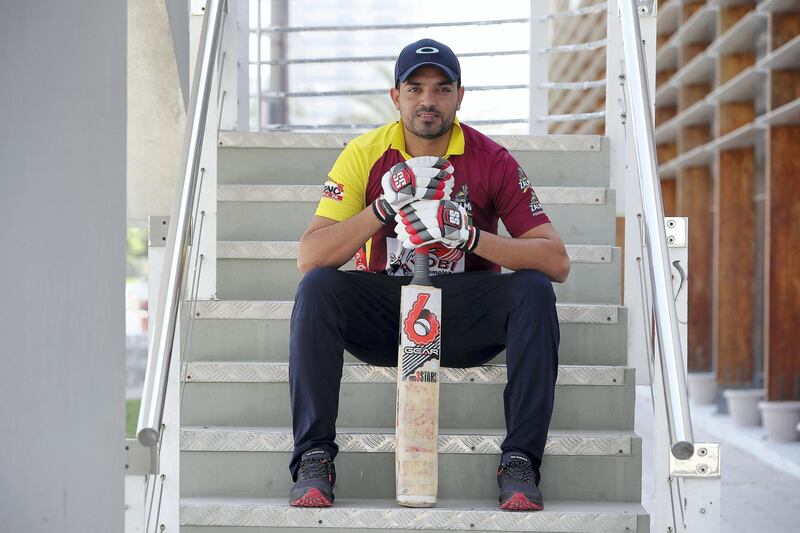In Afghanistan, cricket fans know him as Habib Ghazi from Dubai. In UAE cricket circles, he is Habib the Afghan.
And in daily life, most people he encounters probably just know him as a kindly salesman talking them through the latest mobile phone packages available.
If ever they made it beyond the rudimentary chat about data plans and overseas call charges, he would likely tell them a story about when he scored a 27-ball hundred in a Twenty20 match in Dubai. Or when he bowled to England in a practice match in Abu Dhabi. Or when he had to have stitches to repair the webbing on his left hand, after being hit while training with the UAE squad bound for the 2015 Cricket World Cup.
________________
Read more:
Mike Gatting recalls trip to India when his MCC-led side were hammered by Afghanistan
Germany experiences huge spike in cricket's popularity since European migrant crisis
________________
Habib lives for cricket. He is well known on the domestic circuit, having bowled fast for leading corporate sides like Ibsons and Alubond Tigers. He still harbours the ambition of earning selection for the UAE team one day.
The story of how he reached this point, though, goes far beyond fours, sixes, and inswinging yorkers.

Entirely in love with cricket
I remember meeting Habib some years ago while sat on a bench under the saplings that line the ICC Academy Oval in Dubai Sports City. My only recollections were that he was friendly, he was Afghan, and his name was Habib.
And that he was entirely in love with cricket. He had just finished one training session. When we met back then, he was whiling away the time watching the match on the main ground, near enough to the net area that he could pick up another practice session if one came along.
He would happily volunteer his services as a net bowler for anyone. Women’s teams, men’s teams, corporate teams, professional teams, international teams. Anything, just to get better. Anything, just to play.
It is a habit he has been in since childhood, although the surroundings are different now. Now, he thinks nothing of playing on the carefully-tended fields of the ICC Academy, or Zayed Cricket Stadium in Abu Dhabi.
It is diametrically opposite to the scene when he first fell for cricket. Back then, he says, he and his first cousin, Gulbadin Naib, would travel from his home in the mountains on the Afghan-Pakistan border on a 40-minute bus journey into Pakistan. They would alight at the Kacha Gari refugee camp, the sprawling mass of mud huts that were home to hundreds of thousands of Afghans who had been displaced by the Soviet and the civil wars.
"I went there a lot," Habib said, as we met again, ostensibly to discuss his thoughts on Afghanistan's impending Test debut. It quickly became apparent that his story was far more worthy of our time than the Test match.
“I learnt cricket there. It was just across the border. Every day I had to get that bus. It was easy to walk across the border, because Pakistan and Afghanistan had good relationships.
“There was no problem, you did not need a visa. Just walk though, nobody would ask you anything. I would get off the bus on the main road, and just next to the main road there were seven or eight grounds, with everyone playing tennis-ball cricket.
“Everyone fell in love with cricket there.”

Kings of Kacha Gari
Afghan cricket famously took root among refugees based the other side of the border. They were taken, in particular, by Pakistan winning the World Cup in 1992.
Unlike many Afghan cricketers of his age, Habib does not have a distinct recollection of Imran Khan’s “Wounded Tigers” and their epoch-making win over England 26 years ago.
He remembers instead a different sporting triumph far more vividly. It was 1994. He had already fallen for cricket, even though Pakistan was by now in thrall to hockey again, having added that World Cup – their fourth – to the one they had won in cricket two years earlier.
“It was the first time I had seen television,” Habib said. “When we went across the border, there was a small television the army soldiers at the border crossing were watching. They won, and everyone was firing [celebratory gunshots in the air].
“I was just a kid and was thinking, ‘What the hell has happened?’ They said ‘Pakistan have won the World Cup!’
"I thought, OK – but it is still not better than cricket.”
His heroes were never the stars of hockey. Nor, even, the Imran Khans, Wasim Akrams, or Javed Miandads of Pakistan’s feted cricket World Cup-winners.
They were instead the kings of Kacha Gari, the stars of refugee camp, tape-ball cricket. Players like Karim Sadiq and Hasti Gul, the future pillars of the Afghan team.
“The tournament was so big, and we were so excited,” he recalled of going to watch one particular tournament, in amongst a grove of lychee trees. “If a batsman or a fielder was thirsty, we were happy just to run water to them. We were this much in love with the game.”

'You are too old'
Life has treated the cricket-besotted cousins, Gulbadin and Habib, differently since. Last week, Gulbadin was a non-playing member of the Afghanistan squad that whitewashed Bangladesh in a three-match T20 series in India.
He played a key part in them qualifying for next year’s World Cup in England, when he scored a vital half-century against the UAE in Zimbabwe in March. Although he is not part of the Test squad to face India, he has been a permanent fixture in their rise over the past decade.
Habib’s story is a marked contrast. It stems from the day he went for a trial for a new Afghanistan Under 17 team, set to tour Malaysia, in 2003. He did not make the cut – on account of looking too old.
It put in motion a three-and-a-half-month odyssey across Europe, resulting in him making an asylum application in Scotland, where he eventually settled for five years.
“When I went for the trial they told me, ‘Oh, you are too old’. They put me in reserve,” Habib said. “I didn’t know how old I was. I don’t know my birthday. I don’t even know the month. We don’t celebrate birthdays.
“At that time – war, Taliban – maybe some hospitals in Kabul gave birth certificates. But in the countryside a lot of people are born in their house and start from there.”

'I wanted to go to Europe'
Afghan birthdays are, more often than not, approximations. Take some of the stars of the pioneering Afghanistan cricket team provide, for instance.
Nawroz Mangal was the long-serving captain and is now the national selector. “Nawroz” means new year, so a safe assumption might be that he was born on or near to the Afghan New Year, which falls around March 21. And yet his birthday is officially recorded as November 28.
Raees Ahmadzai, another former player who is now part of the management, has explained in the past that his mother estimated his birthday based on who she remembered as being president at the time. Despite officially being a mere 33 years old, Ahmadzai has been a long-time retired from playing.
So selectors picking age-group teams have to judge on merit, while also guessing at the veracity of an age.
“First they told me I was too old,” Habib said of his own age-group trial. “After two days, the squad came, and I was in reserve. I said, ‘Forget this’, and went home. Enough with cricket. From there, I wanted to go to Europe.”
As furious as he was, the rejection from the cricket team was not exactly the only thing that drove him away from his homeland. There was also the small matter of the ongoing insecurity in a country still trying to piece itself back together after the United States-led removal of the Taliban from power in 2001.
“I sought asylum because I felt I didn’t have anything there,” Habib said. “We had problems with some relatives. It always happens. And there are people, bad people around you, offering things.
“When you live in a society, there are good people and bad people. Sometimes we saw bad people. They approach you in a nice way, offer you something. They say, ‘Hey, why don’t you come there. You can learn how to shoot.’
“A lot of my friends went. But they ran away, and came back. They [the Taliban] won’t force you, but they tell you many things, and some people will believe in it.
“In Pakistan it was never physical. In Afghanistan, it was. They would say, 'Do this, do that.' In the end, they brainwash you. I got tired because of that. And I was upset because I wasn’t selected. Because of that, I went.”

'Rome, wow'
Early one morning, he went by bus from his home in Torkham, a volatile border town, to Quetta in Pakistan, and then on to Iran. He was part of a group of 11 people that had agreed a deal with an agent to transport them to Europe.
Habib had known only one member of the group previously, and that only in passing, having seen the man selling shampoo outside Kacha Gari.
“From there they pass you to other people, then to other people, easy, easy,” Habib said. “Then once we got to Istanbul, they said, ‘Right, now you guys can walk outside. This is Europe.’
“He [the agent] said, ‘Don’t fight, don’t steal anything, and you can walk around. Go outside and enjoy, and in three or four days, we will go to Greece.’
“After two weeks, we went to the Greece border. There, we were caught by the government, and we were told that in three days we had to leave: go back, or go to Italy.”
Of the 11 who started out in Afghanistan, four made it as far as Europe. The shampoo-seller was one of them. Now, Habib says, he lives in London and has a British passport.
They had stayed in a camp, alongside Iraqis and Somalis, near a shipyard in Greece, waiting for the right moment to move on. It took a month.
“We had an Afghan agent,” Habib said. “One day, he woke me up and said, ‘Let’s go, it’s time’. Every day, people were trying. The police can kick you, but they cannot beat you badly.
“People were climbing, and we climbed onto a watermelon truck. We made a space. There was two of us guys. It must have taken us eight or nine hours.”
He was told that the ship was going to Italy, and to stay silent.
“When [the driver of the lorry] stopped, we started banging,” Habib said. “He didn’t know we were there. When he found us, he was very angry, swearing at us. I don’t know what he was saying.
“We got out at a motorway and found a small village. We asked the way to the train station. An Indian guy was there, I was asking him in Hindi, ‘Do you know the way to Rome?’
“He said, ‘Oh, it’s two hours away.' I said, ‘Two hours is very good for us!’ We got a train and went from there to Rome. Rome, wow. It was awesome. I fell in love with this place. It was so amazing.”

Seeking asylum in Scotland
As magnetic as Italy was, it was not the end of his trip. He knew people in London, and he wanted to get there. The onward journey involved sleeping outside train stations in Paris, before he arrived at the camp in Calais, the French port town, which later became known as “The Jungle”.
“I was so lucky,” he said. “When I arrived at the border, people were telling me they had been staying there, in the jungle in Calais, for seven months.
“I went and spoke with the agent, and asked how much. He said: ‘Try it. If you miss it, your €500 are gone. If you want a guarantee, it is 2,000.’
“The first night, I tried - and went through. I went through with a family. I remember the UK border like it was yesterday. A guy saw us. Maybe he felt sorry because there was a woman.”
Habib made it out at a petrol station just north of London. Friends in the English capital came to collect him straight away. “I slept for three days,” he said.
Still his journey had a distance to run. He travelled on north to Glasgow. As soon as he arrived, he found a police station, and requested asylum.
He was placed in accommodation in Maryhill, next to the football stadium of Partick Thistle, a professional football team. Although Habib knew of football, thanks to the Somali friends he had made on his journey, his other sporting passion remained true.
He asked his designated social worker if there was any way he could join a cricket club. The social worker knew nothing of cricket, but consulted Google, and found a club that trained on Wednesday nights in the West End of Glasgow. Habib trained with them, and also picked up matches with teams from the city’s Pakistani community, who often paid him to play.
Cricket helped him in a variety of ways, during his five-year stay in Scotland. “I learnt all my English from Scottish people,” he said. “I spent a lot of time in Edinburgh, and they don’t speak like Glaswegians.”
The club he came to call home was Carlton, which was produced Scotland internationals such as Gordon Drummond and Preston Mommsen. His statistics still feature on the Edinburgh-club’s website, under the name MB (Mohammed Habib) Ahmadzai (which is the name of his tribe).

Return to Afghanistan
Habib had to leave Scotland in 2010. Despite the epic trip he made to get away from Afghanistan, he was by now ready to return there, rather than make another new home somewhere else. He had a good reason, he says. “I wanted to go back to Afghanistan as I knew cricket was getting big there.”
On his return, he found life had changed. He got a job, again across the border in Peshawar. He was focused on work, and gathered enough savings to make one more trip. Again, it proved seminal.
He flew from Kabul to Dubai to visit the friends he had made in the Scotland national team. They were playing in the qualifying tournament for the 2010 World T20, which was to be played in the West Indies.
It was a portentous event. Afghanistan won the tournament – coincidentally beating the US in the process – to secure passage to a global event for the first time.
When qualification was achieved, via a semi-final win over the UAE, there was a wild outpouring of joy by Afghan supporters. It spilled over onto the outfield, as supporters performed traditional “attan” dances, and waved framed photos of President Hamid Karzai, as well as the Afghan tricolour.
By the time the final took place, later that evening against Ireland, word was well and truly out. Dubai International Stadium was engulfed, and supporters scaled locked fences of the ground’s top tier to find seats. Taj Malik Alam, the assistant coach, was handed the microphone to announce in Pashto across the public address system to plead for no more pitch invasions. His request was heeded without complaint.

'My main aim was to play for UAE'
Despite the triumph for his compatriots on the field, Habib was mulling the suggestions made by his Scottish mates that perhaps Dubai might provide greater opportunities for him than his home country did. And safer, too.
His course was altered again when he found a job with a burger restaurant chain in UAE. His move from there into A-division cricket came about when he was discussing the merits of a burger with a customer, who also happened to be the owner of one of the country’s leading cricket teams.
Flitting between playing high-level cricket here, bowling to leading touring teams in the ICC Academy nets, as well as occasionally travelling back to Afghanistan to play in increasingly sizeable T20 tournaments, he made a name for himself. Habib the Afghan was turning heads.
His cricket career came full circle when he caught the eye of Aaqib Javed, one of Pakistan’s World Cup heroes in 1992 who was now coach of the UAE.
“By now my main aim was to play for UAE,” Habib said. “I was training with them as they were getting ready to play at the 2015 World Cup.”
His hopes were subsequently dashed when, while changing jobs, his return to Dubai from Afghanistan was delayed to the point he missed national team trials.
By necessity, cricket has now taken a back-seat to his day job in sales for a mobile phone company. It means he is no closer to playing for his adopted country.
But a man who has been through so much to reach this point is not about to give up just yet. “I’m thinking I will give it one more year,” he said.
_________________
Also read:
Special report: The stars of street cricket
_________________





